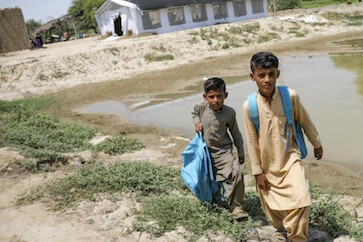In March 2022, after more than 180 days out of the classroom, girls in Afghanistan in grades 7 through 12 learned that their schools would remain closed.
Cut off from their teachers, friends and the familiar, encouraging school environment, the adolescent girls in the video below speak out from Kabul, sharing their grief and determination.
“I will never lose hope and I want the schools to open again.”
“My younger sister goes to school,” said Maryam, 15. “When she comes back, I help her with her homework, and it breaks my heart not to be able to go to school like her.”
“Whenever I try to study, I face a lot of problems and questions that I cannot solve and only my teacher can solve for me,” said Arezzo, 13. “I wanted to put my school uniform away, but I couldn’t bring myself to do it.”
A terrrible economic impact
Even before the Taliban seized power on August 15, 2021, more than 4.2 million children in Afghanistan were out of school. Sixty percent were girls.
Keeping girls out of high school prevents girls from reaching their full potential. It also costs Afghanistan 2.5 percent of its annual Gross Domestic Product (GDP), according to a new analysis by UNICEF.
If the current cohort of 3 million girls were able to complete their secondary education and participate in the job market, girls and women would contribute at least $5.4 billion to Afghanistan’s economy.
A violation of the fundamental right to education
“The decision on March 23 not to allow girls back to secondary school was shocking and deeply disappointing,” said UNICEF Afghanistan Representative Dr. Mohamed Ayoya. “Not only does it violate girls’ fundamental right to education, it exposes them to heightened anxiety, and greater risk of exploitation and abuse including child trafficking, early and forced marriage. Now, this new analysis clearly articulates the terrible economic impact of this decision on the country’s GDP.”
The future of the girls of Afghanistan hangs in the balance.
“If the school doesn’t open, I will choose whatever way there is to get an education,” said Arezzo, who wants to become a pilot. “I’m committed to continuing my education however or wherever I can. I will never lose hope and I want the schools to open again.”
UNICEF won’t stop fighting for every child’s right to a quality education. Your contribution can make a difference. Please donate today.
The bipartisan Keeping Girls in School Act is designed to harness the power of U.S. Government to address the barriers that prevent girls from getting an education. Urge your Members of Congress to support legislation that empowers girls around the world.
Top photo: The March 2022 announcement that adolescent girls in Afghanistan would not be permitted to return to school left 15-year-old Fatema, a sixth grader in Kabul, “sad and disappointed, not only for myself,” she said. “I am really upset about every single girl who loves to continue their education and is not allowed to.” Fatema wants to study economics, like her mother, and become a businesswoman. © Photos by Mohammad Haya Burhan for UNICEF. Video edited by Tong Su for UNICEF USA.





